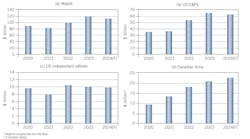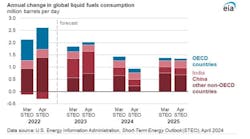On June 13 the US House Natural Resources Committee approved HR 2337, the energy reform bill proposed by NRC Chairman Nick J. Rahall (D-W.Va.), after less than a week of markup sessions. NRC members began the measure’s markup on June 7 and expectations were at the time for a long, drawn-out session.
On June 8, NRC members returned the second day to consider minority amendments that would strike major portions of the measure after debating relatively minor changes the first day.
The bill arrived at markup with Rahall’s own massive amendment, which he said was designed to address concerns raised following HR 2337’s introduction on May 16.
Rahall’s amendments
Among provisions involving oil and gas, Rahall’s amendment substituted a $1,700 onshore drilling permit processing fee that the administration of President George W. Bush had proposed, but that the 2005 Energy Policy Act (EPACT) had removed. HR 2337 originally did not specify an amount.
Instead of completely repealing categorical exclusions from the National Environmental Policy Act for some oil and gas activities that EPACT authorized, the amended bill allowed this if it followed guidelines set by the Western Governors Association to protect wildlife habitat and migration corridors in developed fields. It also contained a clarification that oil and gas activities exempted from environmental review by categorical exclusions follow Council for Environmental Quality regulations.
Rahall’s amendment also proposed changing the original bill’s produced water provision requiring replacement of water resources from federal lands by specifying “replacement or remediation” instead. This would give operators more flexibility in addressing water concerns, Rahall said. The amendment also would require lessees to submit a water management plan with their drilling permit applications instead of when the US Bureau of Land Management issues a lease, as specified in the original bill.
The amendment’s biggest single change was an apparently complete rewrite of the bill’s section dealing with wind energy. Minor changes also were proposed in the energy corridor, solar, and renewable energy provisions.
Left unchanged were sections that would repeal oil shale lease development authorized by EPACT, limit oil royalty in-kind payments to refilling the Strategic Petroleum Reserve, require the US Minerals Management Service to conduct at least 550 audits yearly by 2009, significantly increase surface landholders’ rights and compensation in split-estate situations on federal leases, and raise onshore oil and gas reclamation fees and bonds.
The original bill and Rahall’s amendment both aimed to roll back EPACT’s requirement that BLM issued decisions on onshore drilling permit applications within 30 days. In the single bit of business directly involving oil and gas during the first day of HR 2337’s markup, however, the committee adopted by voice vote an amendment by Rep. Jim Costa (D-Calif.) to keep the requirement but extend BLM’s response deadline to 90 days.
Following approval by the committee, the only significant change to the Rahall amendment affecting oil and gas was the preservation of the requirement for the US BLM to meet a deadline on processing onshore drilling permit applications. This was extended to 90 from 30 days.
The provision imposing the Bush administration’s proposed $1,700/permit processing fee on producers remained intact as did the provision delaying implementation of EPACT’s oil shale leasing provision.
Critical responses
Republican committee members expressed their displeasure with the bill in their opening statements during the first day of markup.
“Not only does it negatively affect the oil and natural gas production that is occurring on less than 1% of the lands owned by the American people, it hurts some of our best alternatives like wind power. It hurts other alternative energies by heaping more government red tape on top of the piles that already exist,” said Chief Minority Member Don Young (R-Alas.).
“We can see that energy prices are already high and headed higher,” said Stevan Pearce (R-NM). “The projections show 20-30% increases in energy costs related to natural gas. These rising costs drive $22 billion projects right out of America, costing us jobs and other opportunities for economic development,” he said.
The committee’s minority also distributed letters from the American Petroleum Institute, the National Association of Manufacturers, the American Chemistry Council, and the US Chamber of Commerce opposing oil and gas and other provisions in the bill. It also presented a 15-page letter from Deputy US Sec. of the Interior P. Lynn Scarlet recommending deletions or amendments.
Some Democrats on the committee also remained critical. Noting that Rahall’s amendment contained some important changes, Dan Boren (Okla.) said, “I know that we can’t drill our way out of higher energy costs, but we should use the resources we have. This bill would slow that process down.”
Others were complimentary. “This bill will be part of a larger energy package that will include other bills before it reaches the floor,” said George Miller (Calif.). “But it considers climate impacts, something that has never happened before in energy legislation before this committee. That’s an important change,” he said.
Neil Abercrombie (Ha.) said, “We’re working today as we received news that Turkish troops moved into northern Iraq in what that government said was a minor action. I find it hard to believe that invading another country is ever minor, and can only wonder what this will do to oil prices.”
Rahall reiterated that federal energy reforms are needed. “It makes no sense that the American taxpayer foots the bill for processing drilling permit applications. It makes no sense that Americans don’t get their fair share of revenues from resources produced from public lands,” he maintained.

